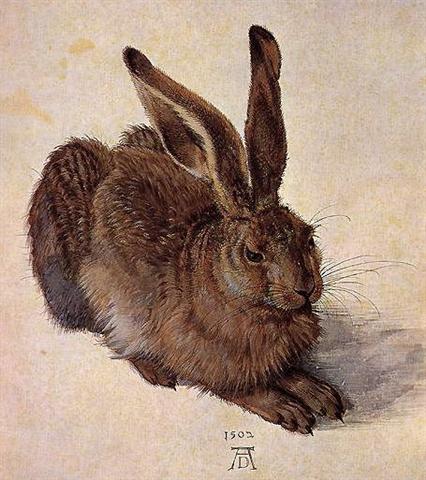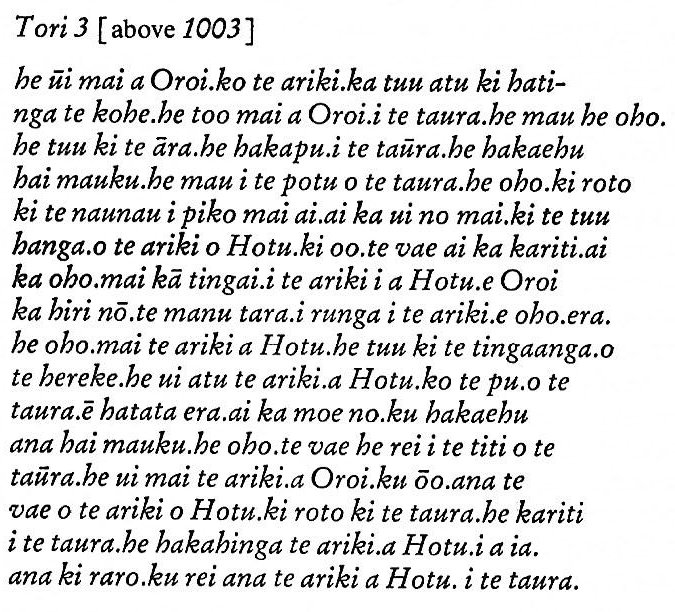
| he tuu
te ariki.a Hotu.he ui i aha.tau
ngaio |
King Hotu arrived [he
tuu te ariki.a Hotu] and asked [he
ui], 'How [i
aha] were these young men killed [i
mamate ai]?'
The voices [te reo]
of the protective spirits (atua akuaku) of Hotu,
namely Kuihi and Kuaha, replied, 'Oroi introduced [hakauru]
the long, sharp antennae of the spiny lobster (vaero
ura) (into the orifice) and the pulled out the
intestines completely [i
kumekume mai i te kokoma ki haho] and left
them hanging (out). This is how [penei
ē] the victims (ika) [te
nga ika ena] were killed [i
mamate ai].' |
| era.i
mamate ai.he ki mai te reo o te atua. |
| akuaku o
Hotu.ko kuihi.ko kuaha.penei ē. |
| a Oroi.i
hakauru.hai
vaero ura.i kume(-) |
| kume mai
i te kokoma ki haho i hoa.te ua |
| o te nga
ika ena i mamate ai.he hakaiti |
| Aha. What? Which? To
do, to be what? He aha koe? what are you?
E-aha-á koe? what are you doing? Ku-aha-á koe?
what have you done? Kahu aha? what, which
garment? E-aha-mai-á ki a koe? what does that do
you, what harm does it do you, what is it to you? Aha
is preceded by the article te when introduced by
a preposition: te: o te aha, why, what for; mo
te aha, ki te aha, what for, with what purpose?
Vanaga. Gaaha, to burst, to become ruptured, to
have a discharge of pus, of blood. Ku gaaha te toto o
te ihu. He had a nose-bleed. E û'i koe o gaaha te
îpu. Be careful not to break the bottle (lit. look
out lest the bottle burst). E tiaki á au mo gaaha mai
o te harakea. I shall wait for the abcess to burst.
Gaatu, totora reed. Vanaga. To break, to split,
to crack, to rive; fracture, fissure, break, crack,
crevice (gaaha); niho gaa, toothache,
broken teeth; gaamiro (miro, ship)
shipwreck; gaàpu (pu 2), abortion; poki
gaàpu, abortive child. T Mq.: naha, nafa,
split, fissure. Ta.: aha, afa, crack
fissure. Gaatu 1. Bulrush, reed. 2. (gatu).
Churchill.
Ihi. 1. Line of singing women at a feast or an
êi. 2. Ihi, ihi-ihi, to break up
into small pieces, to crumble, to tear to pieces;
he-ihi i te maúku, to separate fibres. Vanaga.
Ihiihi, to hop. Churchill.
Hai: 1. With (instrumental). 2. To, towards.
He oho hai kona hare, to go home. He oho hai
kona hagu, mo kai, to go where there is food to eat.
3. Give me: hai kumara, give me some sweet
potatoes. Ha'i: 1.To give, to deliver, to hand
over. 2. To carry under the armpit. 3. To hug, to
embrace. 4. To wrap up; parcel, packet. Ha'iga,
armpit. Haîara, to guide, to direct (someone).
Ka haîara koe i taaku poki ki te kona rivariva,
guide my son to a good spot. Vanaga. 1. To wrap up, to
make into parcels, to envelop; food tied up in bundles (ai).
PS Sa.: sai, a tightly bound bundle. To.:
haihai, to tie up in a bundle. Fu.: sai, to
tie; saisaiga, a bundle. Niuē:
hai, to tie
fast. 2. To carry, to transport. Ta.: afai,
to carry an object, to transport; afafai,
capable of carrying a heavy burden, to carry here and
there. 3. To be in heat, to copulate, to embrace;
concupiscence, fornication, impurity; lascivious, impure
(ai). P Ta.:
ai, to
copulate. Haiga,
armpit. PS Sa.: fa'iga,
a joint. Haipo,
heart; haipo rahirahi,
shortness of breath. Mq.: houpo,
heart. Haite
(ha
causative, ite)
numeral. Churchill. Pau.: haifa,
virile, manly. Ta.: aiaha,
a brave young warrior. Churchill. Mgv.: hai,
a fish. Ta.: fai,
the stingray. Mq.: fai,
hai, id. Sa.:
fai, id. Ma.:
whai, id.
Haihai,
evening (metathetic). Sa.: afiafi,
id. Churchill.
Vaero.
Chicken's long tail feather; lobster's antenna (vaero
ura). Vanaga. Tail of a kite, tail of a bird (uero).
T Pau.: tuavaero, rump; kaero, tail. Mgv.:
vero, tail. Mq.: veó, id. Ta.: aero,
id. Churchill.

Iti. Little, small, medium; iti atu,
less; iti no, small quantity, rare; no iti,
superficial. Itia, shrunken. Itiiti,
scanty, slim; hare itiiti no, cabin; itiiti
noa, mediocre, mediocricity. Hakaiti, to make
small, to lessen, to weaken, to impoverish, to thin out,
to reduced, to diminish, to retrench, to curtail, to
subdue, to mitigate, to abate. Hakaitiiti, to
squat, to croach. P Mgv.: iti, small. Mq.: iti,
id. Ta.: iti, id. Churchill. |
| a Hotu.i
te tangi.mo nga hahaki a
Roro. |
Then Hotu started lamenting
(tangi) the death of Hahaki A Roro and his
brothers [nga hahaki a
Roro] with these words [penei
ē]: |
| penei ē. |
| Ha. 1. Four. 2. To
breathe. Hakaha'a, to
flay, to skin. Vanaga. 1. Four. P Mgv., Mq., Ta.: ha, id.
2. To yawn, to gape. 3. To heat. 4. Hakaha, to
skin, to flay; unahi hakaha, to scale fish. Mgv.:
akaha, to take to pieces, to take off the bark or
skin, to strip the leaves off sugarcane. 5. Mgv: ha,
sacred, prohibited. Mq.: a, a sacred spot. Sa.:
sa, id. Churchill. Haha. 1. Mouth (oral
cavity, as opposed to gutu, lips). 2. To carry
piggy-back. He haha te poki i toona matu'a, the
child took his father on his back. Ka haha mai,
get onto my back (so I may carry you). Vanaga. 1. To
grope, to feel one's way; po haha, darkness,
obscure. 2. Mouth, chops, door, entrance, window;
haha pipi, small mouth; haha pipiro, foul
breath; ohio haha, bit of bridle; tiaki haha,
porter, doorkeeper. Churchill. Hahaga. Ridge,
summit, wall plate. Maroa hahaga, to measure
lands, to walk at a great pace. Churchill. Haki.
Certainly. Churchill. |
|
Tori 1
E:1001
To. 1.
Particle sometimes used with the article in ancient
legends; i uto to te hau, the ribbon was in the
float. 2. To rise (of the sun) during the morning hours
up to the zenith: he-to te raá. Vanaga. 1. Of. T
Pau., Ta.: to, of. Mgv.: to, genitive
sign. Mq.: to, of, for. 2. This, which.
Churchill. Mgv.: To, to make a canoe of planks.
Mq.: to, to build a canoe. Sa.: to, to
build. Churchill.
Ri. 1.
Mgv.: ri, a
string, a girdle, to tie together. Sa.:
li, the
sennit lashing of canoe outriggers. Mgv.:
rino, to
twist a thread between the forefinger and thumb. Ta.:
nino, to
twist, to spin. Mq.:
nino, id. Ma.:
rina, a twist of two or three strands. 2.
Ta.: ri, to
hang. Ha.: li,
to hang by the neck.
Hakariga, to subdue. Churchill. |
| tute nui
no mai koe.e Oroi e. mai hiva mai |
You alone have continued the
great persecution, oh Oroi [e
Oroi e], from Hiva, from the (home)land [mai
hiva mai te kainga], so that the father (?)
would not achieve g reatness [o
hau a koro.au]. Woe my children (?) [ē
aki poki ē]!
Great pei fish of Te Hakarava! [pei
nui o te hakarava] Great lobster of Te
Manavai! [ura nui o te
mana vai] Great moray of Te Manavai! [koiro
nui o te mana vai] Great eel of Tea Vai Aro
Huri! [koreha nui o te
a.vai.arō huri] |
| te
kainga.o hau a koro.au ē aki poki pei nui |
| o te
hakarava ē. ura nui o te mana vai.koiro |
| nui o te
mana vai.koreha nui o te a.vai.arō huri. |
| he
mounga ana te tangi nei. |
When the lament was finally
over [he mounga ana te
tangi nei], they took them (the dead) and
buried [muraki]
them in the burial place [i
roto i te ahu] of Ahu Ature Hoa (i.e., in
Anakena). |
| he mau
hee muraki.i roto i te ahu. i āhū a tu(-) |
| re
hoa.angiangi e te tangata.penei ē.a
Oroi |
Now the people knew: (It
was) Oroi's doing that Hahaki A Roro and his (brothers)
had their intestines torn out [i
kumekume i te kokoma]. |
| i
kumekume i te kokoma.o nga hahaki.a Roro. |
| he kē.te
ariki a Hotu.penei ē.i piko
no mai a |
Then King Hotu grieved with
the following (words): 'Oroi had secretly hidden himself
when he came (with us) on board the canoe to this
place.' |
| oroi.i
oho mai nei i runga i te miro. |
|
Ore. 1. Ha.,
ole, to speak through the throat, guttural, or
through a trumpet; name of a large sea-shell; ole-ole,
talk thickly or indistinctly, as one angry or scolding,
to grin like the idols; olo, to be loud, as a
sound, as a voice of wailing; olo-olo, intens. to
roar, rush, as the sound of waters. Sam., ole, to
ask, to beg; olo, to ooo as a dove; faa-olo,
to whistle for the wind. Ta., oro-io, to grieve
to death; ta-oro-oro, make a noise, rumble at the
bowels. To., kole, to beg. Fiji., kodrau,
to squeal; qolou, to shout. 2. Ha., ole,
the eye-tooth, name of a fish; ole-ole, to make
notches in anything, to dovetail two pieces together.
Ta., ore-ore, the teeth of sharks or of the
ono fish. Fornander.
Piko. 1.
To twist (vi); twisted, bent; haga piko, bend
formed by part of the coast. 2. To hide (vi); hidden;
kahi piko, tuna fish meant as a gift for someone,
and which is kept hidden away from others. 3. Slip knot
(used with fishing lines). Vanaga. 1. Post; moa tara
piko, cock with long spurs. 2. Crooked, tortuous;
piko mai piko atu, sinuosity; hakapiko,
pliant, to bend; pikopiko, crooked; hoe
pikopiko, pruning knife; veo pikopiko, arrow
that flies ill. 3. To hide oneself, to lie in wait, to
set a trap, to take refuge, to withdraw, to beat a
retreat, security, ambush, padlock; piko reoreo,
false security; piko etahi, to withdraw one after
another; pikoga, asylum, receptacle, refuge,
retreat, snare. Churchill. H. Piko Umbilical
cord. Hawaiians are connected to ancestors (aūmakua),
as well as to living kinsmen and descendants, by several
cords emanating from various parts of the body but alike
called piko, 'umbilical cord'. Islands of
History. H. Piko 1. Navel, navel string,
umbilical cord. Fig. blood relative, genitals. Cfr
piko pau 'iole, wai'olu. Mō ka piko, moku
ka piko, wehe i ka piko, the navel cord is cut
(friendship between related persons is broken; a
relative is cast out of a family). Pehea kō piko?
How is your navel? (A facetious greeting avoided by some
because of the double meaning.) 2. Summit or top of a
hill or mountain; crest; crown of the head; crown of the
hat made on a frame (pāpale pahu); tip of the
ear; end of a rope; border of a land; center, as of a
fishpond wall or kōnane board; place where a stem
is attached to the leaf, as of taro. 3. Short for
alopiko. I ka piko nō 'oe, lihaliha (song),
at the belly portion itself, so very choice and fat. 4.
A common taro with many varieties, all with the leaf
blade indented at the base up to the piko,
junction of blade and stem. 5. Design in plaiting the
hat called pāpale 'ie. 6. Bottom round of a
carrying net, kōkō. 7. Small wauke
rootlets from an old plant. 8. Thatch above a door.
'Oki i ka piko, to cut this thatch; fig. to dedicate
a house. Wehewehe.
Hiro. 1. A deity invoked when praying for rain
(meaning uncertain). 2. To twine tree fibres (hauhau,
mahute) into strings or ropes.
Ohirohiro,
waterspout
(more exactly pú ohirohiro), a column of water
which rises spinning on itself. Vanaga. To spin,
to twist. P Mgv.: hiro, iro, to make a
cord or line in the native manner by twisting on the
thigh. Mq.: fió, hió, to spin, to twist,
to twine. Ta.: hiro, to twist. This differs
essentially from the in-and-out movement involved in
hiri 2, for here the movement is that of rolling on
the axis of length, the result is that of spinning.
Starting with the coir fiber, the first operation is to
roll (hiro) by the palm of the hand upon the
thigh, which lies coveniently exposed in the crosslegged
sedentary posture, two or three threads into a cord;
next to plait (hiri) three or other odd number of
such cords into sennit. Hirohiro, to mix, to
blend, to dissolve, to infuse, to inject, to season, to
streak with several colors; hirohiro ei paatai,
to salt. Hirohiroa, to mingle; hirohiroa ei
vai, diluted with water. Churchill. Ta.: Hiro,
to exaggerate. Ha.: hilohilo, to lengthen a
speech by mentioning little circumstances, to make nice
oratorial language. Churchill.
Whiro
'Steals-off-and-hides'; also [in addition to the name of
Mercury] the universal name for the 'dark of the Moon'
or the first day of the lunar month; also the deity of
sneak thieves and rascals.
Makemson. |
| he e(a)
hokoou atu a Vakai.he oho.he oo.ki roto |
Again Vakai arose, went, and
entered into the house of King Hotu, into (the house)
Hare Moa Viviri. |
| ki te
hare.o te ariki a Hotu.i hare moa
viviri. |
| he tuki
hokoou te ariki a Hotu.he tupu. i
te iva |
Again Hotu begot (a child).
It grew [he tupu]
for nine months [i te
iva o te marama] and then a boy was born [he
topa tamaaroa]. He was given the name [he
nape i te ingoa] Tuu A Hotu Iti (crossed out.
ko te mata iti 'the small eye', wordplay 'the
small tribe') A Hotu. |
|
o te marama.he topa
tamaaroa.he nape i te ingoa. |
ko
Tuu a hotu iti.
(Crossed out: ko te mata iti).
a Hotu. |
| ... The element
viri shows
that the primal sense is that of causing a motion in
rotation ...
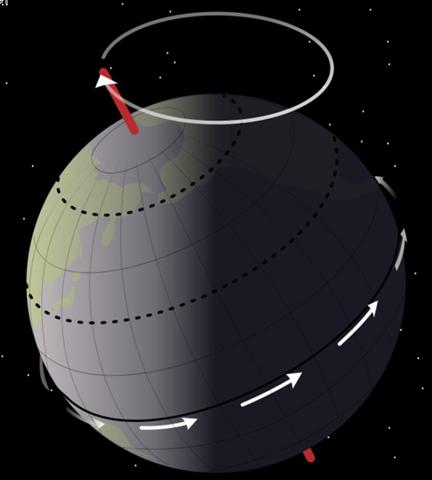
 |
|
Tori 2
E:1002
|
| he noho
te ariki a Hotu. he tuu ki te tahi |
Another month went by [King
Hotu remained (there) for a month], and he was full of
longing [he topa tangi a
mua] for his adopted child, Veri Hina. |
|
marama.he topa tangi a mua.mo taana |
| maanga
hangai.ko veri hina. |
| he ea he
oho. te ariki.a Hotu.he tuu ki mua |
King Hotu arose and went
away [he ea he oho. te
ariki.a Hotu]. He came to the front of the
house in Mahatua [he tuu
ki mua ki te hare ki mahatua]. He entered [he
tuu], greeted them [he
aroha], and wept (because of the reunion) [he
tangi]. |
| ki te
hare ki mahatua.he tuu he aroha.he
tangi. |
| ...
Certain Polynesian customs can more easily be understood
by us if they are seen as a straight reversal of things
we do ourselves. The Maori custom of weeping over
friends or relatives when they return, rather
than when they go away, is one example, which has a
logic not impossible to grasp ... |
| he
noho.i te ha(r)e o toona kope.hunonga.he otea |
He remained in the house (?) of his
young son-in-law. |
| he kī.te
ariki.a Hotu.kia Veri hina.penei ē. |
It grew light [he
otea], and King Hotu said the following [penei
ē] to Veri Hina: 'Keep your eyes on me, (you
and) the son-in-law, as soon as I leave. If the terns (manu
tara) fly (high) above me (hiri), I shall
continue to live. But if the terns dive (down) on me (vevero),
then I have died. Then you (you and the son-in-law)
shall go on your way!' |
| e ui atu
tokorua mata ko te hunonga kia au |
| ka
oho.nei au.ana hiri no te manu tara.i ru- |
| nga.i a
au.e ora no ana a au. ana vevero
te ma- |
| nu tara
i runga i a au.ku mate ana a au.e |
| oho atu
korua ko te hunonga.he haka.hoki |
| When swallows are flying
high it is a sign of good weather, when they fly low it
is the opposite. All who are observant know this.
Vero. To
throw, to hurl (a lance, a spear). This word was also
used with the particle kua preposed: koía kua
vero i te matá, he is the one who threw the obsidian
[weapon]. Verovero, to throw, to hurl repeatedly,
quickly (iterative of vero). Vanaga. 1. Arrow,
dart, harpoon, lance, spear, nail, to lacerate, to
transpierce (veo). P Mgv.: vero, to dart,
to throw a lance, the tail; verovero, ray, beam,
tentacle. Mq.: veó, dart, lance, harpoon, tail,
horn. Ta.: vero, dart, lance. 2. To turn over
face down. 3. Ta.: verovero, to twinkle like the
stars. Ha.: welowelo, the light of a firebrand
thrown into the air. 4. Mq.: veo, tenth month of
the lunar year. Ha.: welo, a month (about April).
Churchill. Sa.: velo, to cast a spear or dart, to
spear. To.: velo, to dart. Fu.: velo,
velosi, to lance. Uvea: velo, to cast;
impulse, incitement. Niuē:
velo, to
throw a spear or dart. Ma.: wero,
to stab, to pierce, to spear. Ta.: vero,
to dart or throw a spear. Mg.: vero,
to pierce, to lance. Mgv.: vero,
to lance, to throw a spear. Mq.: veo,
to lance, to throw a spear. Churchill 2. WELO,
v. Haw., to float or stream in the wind; to
flutter or shake in the wind, s. the setting of
the sun, or the appearance of it floating on the ocean;
welo-welo, colours or cloth streaming in the
wind, a tail, as of a kite, light streaming from a brand
of fire thrown into the air in the dark;
hoku-welo-welo, a comet, a meteor; ko-welo,
to drag behind, as the trail of a garment, to stream, as
a flag or pennant. Sam., Tong., welo, to dart,
cast a spear of dart. Tah., wero, to dart, throw
a spear; a storm, tempest, fig. great rage; wero-wero,
to twinkle, as the stars. Marqu., weo, a tail.
Mangar., wero, a lance, spear. Greek, βαλλω,
εβαλον, to
throw, cast, hurl, of missiles, throw out, let fall,
push forward; βελος,
a missile, a dart; βελεμνον,
id., βολη, a
throw, a stroke; βολος,
anything thrown, missile, javelin, a cast of the dice.
Sanskr., pal,
to go, to move. To this Benfey refers the Lat.
pello, Greek
παλλω, O. H. Germ.
fallan,
A.-Sax. feallan.
Liddell and Scott are silent on these connections ...
(Fornander) |
| mai.a
Veri hina.i te kī.ku mao
ana.e koro ē. |
To this Veri Hina replied [he
haka.hoki mai i te kī], 'Agreed, father [e
koro ē], we both, (I and) the son-in-law,
shall keep a lookout.' |
| e ui no
atu maua ko te hunonga. |
| Possibly the name Veri
hina referred to the 'spear' defining 50 days after
Porrima, viz. Vrischika. Hina (derived from 'to
shine' - like the first part in such words as Simha,
Singha etc for Lion) was a name for females,
especially the Moon. 314 + 50 = 364 → MARCH 20.
Mou. 1. Enough (moua,
mouga). PS Sa.: mou, many. 2. To get (mau);
hakamou, id. 3. To use up, to expand, to absorb;
hakamou, to spend; hakamoumou, to use up, to
expend. 4. To be silent, shy, dejected, stupid,
taciturn, mute, uncomplaining, silence, shut up!,
attention!; mou no, to speak in laconic terms,
dull, mute, silence; hakamou, to silence, to shut
up, to quiet. Mq.: mou, peace, tranquil, quiet.
5. To cease, to end, to finish, to conclude; a pact,
agreement; mou noa, to endure (mau); mou a te
toua, reconciliation; ina kai mou, always,
eternal, perpetual; ina e ko mou, incessant; e
ko mou, always; tae mou, permanent,
perpetual; hakamou, to accomplish, to end, to
conclude, to consummate, to conciliate; e ko moumou,
indissoluble; hakamoumouga, the finish,
termination, Mgv.: mou, to quench the thirst. 6.
To harass; mou no, to suffer damage; hakamou,
to abolish, abrogate, annihilate, nullify, annul,
impoverish, destroy, interrupt, exsterminate, plunder,
smooth out folds; moumou, to devastate, pillage,
devastation, destruction; hakamoumou, to
demolish, to ravage, to suppress. Ta.: mou, to
extinguish, to destroy. Moua, enough, past (mou,
mouga). Churchill. |
he
oho.mai te ariki a Hotu. (Crossed out: he
oho.mai) a tai |
The king went towards the
sea [a tai]
(i.e., toward the southern shore). When he reached
Hatinga Te Kohe A Hau Matua, |
| ana he
tuu ki te hatinga te kohe. a Hau Maka. |
|
|
|
Tori 3
E:1003
|
| he ūi
mai a Oroi.ko te ariki.ka tuu atu ki hati- |
Oroi saw [he
ūi mai a Oroi]
that the king had reached Hatinga Te Kohe [ko te
ariki.ka tuu atu ki hatinga i te kohe]. Oroi picked up the rope,
took it [he mau], and came to the path (which the
king had to pass), and took the end of the rope into his
hand [he mau i te potu o te taura]. |
| nga i te kohe.he too mai
a Oroi.i te taura.he mau he
oho. |
| he tuu ki te
āra.he
hakapu.i te
taūra.he
hakaehu |
| Taura hiri, to make a
cord.
Ara. 1. Road, path; ladder. 2. To wake up, to
concentrate on something; he-ara te mata, to
inspect attentively; hé-ara, he-ûi a raro o te vai
kava, concentrating, he looked at the sea-bottom.
Ará-ará, to signal, to send signals with the hand
(to another person in the distance): he-haaki-atu hai
rima ará-ará. Vanaga. 1. Path, trail, road, way. 2.
a. To awake, to arouse; veve ara, to awaken;
hakaara, to arouse, to excite. b. To be awake;
hakaara, to be awake; ara no, insomnia,
sleeplessness. c. To watch, to guard; tagata ara,
sentinel. Churchill.
Ki te āra = ki te-a ara ought to refer to the
upside down fire-altar in the sky named Ara:
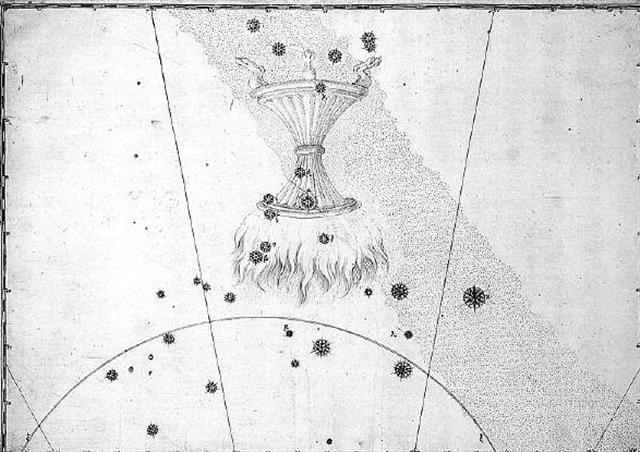
Similarly, he hakapu.i te taūra.he hakaehu
could be read as 'to make a hole (he hakapu) in
the season of the lobster (i te tau-ura), to make
ashes (he hakaehu)'.
Hai: 1. With (instrumental). 2. To, towards.
He oho hai kona hare, to go home. He oho hai
kona hagu, mo kai, to go where there is food to eat.
3. Give me: hai kumara, give me some sweet
potatoes. Ha'i: 1.To give, to deliver, to hand
over. 2. To carry under the armpit. 3. To hug, to
embrace. 4. To wrap up; parcel, packet. Ha'iga,
armpit. Haîara, to guide, to direct (someone).
Ka haîara koe i taaku poki ki te kona rivariva,
guide my son to a good spot. Vanaga. 1. To wrap up, to
make into parcels, to envelop; food tied up in bundles (ai).
PS Sa.: sai, a tightly bound bundle. To.:
haihai, to tie up in a bundle. Fu.: sai, to
tie; saisaiga, a bundle. Niuē:
hai, to tie
fast. 2. To carry, to transport. Ta.: afai,
to carry an object, to transport; afafai,
capable of carrying a heavy burden, to carry here and
there. 3. To be in heat, to copulate, to embrace;
concupiscence, fornication, impurity; lascivious, impure
(ai). P Ta.:
ai, to
copulate. Haiga,
armpit. PS Sa.: fa'iga,
a joint. Haipo,
heart; haipo rahirahi,
shortness of breath. Mq.: houpo,
heart. Haite
(ha
causative, ite)
numeral. Churchill. Pau.: haifa,
virile, manly. Ta.: aiaha,
a brave young warrior. Churchill. Mgv.: hai,
a fish. Ta.: fai,
the stingray. Mq.: fai,
hai, id. Sa.:
fai, id. Ma.:
whai, id.
Haihai,
evening (metathetic). Sa.: afiafi,
id. Churchill.
|
E:56 |
|
1 |
Banana shoots |
te huri maika |
|
2 |
Taro seedlings |
te uru taro |
|
3 |
Sections of Sugarcane |
tepupura toa |
|
4 |
Yam roots |
te uhi |
|
5 |
Sweet potatoes |
te rau kumara |
|
6 |
Hauhau trees |
te hauhau |
|
7 |
Paper Mulberry trees |
te mahute |
|
8 |
Sandalwood trees |
te naunau |
|
Nau.
Sandalwood which used to grow on the steep
slopes of the coast: nau opata.
Vanaga. The Sandalwood (Santalum)
tree. During the birdman ceremonies at
Orongo, a piece of sandalwood was tied
to the arm with which the victorious birdman
held up the egg of the sooty tern. |
|
9 |
Toromiro trees |
te toromiro |
|
10 |
Ferns |
te riku |
|
11 |
Rushes |
te ngaatu |
|
12 |
Yellow roots |
te pua |
|
13 |
Tavari plants |
te tavari |
|
14 |
Moss |
te para |
|
15 |
Nga Oho plants |
te ngaoho |
|
16 |
Grass |
te mauku tokoa |
|
| hai
mauku.he mau i te potu o te
taura.he oho.ki roto |
He went into a (grove of)
sandalwood. He had hidden there so he could watch the
arrival of the king and (at the moment when) the foot
(of the king touched the loop) quickly pull the rope. Then Oroi would come out immediately and
kill the king. |
| ki te naunau i piko mai ai.ai ka ui
no mai.ki te tuu |
| hanga.o te ariki o Hotu.ki oo.te vae
ai ka kariti.ai |
| ka oho.mai kā
tingai.i te ariki i a Hotu.e Oroi |
| ka
hiri
nō.te manu tara.i runga i te ariki.e oho.era. |
The terns calmly circled [ka
hiri nō.te manu tara] above the king
when he arrived [e
oho.era]. King Hotu came along and reached Te
Tingaanga O Te Hereke (literally, 'the meeting place of
the dangerous one' ?). |
| he
oho.mai te ariki a Hotu.he tuu ki te tingaanga.o |
| Hiri. The germ sense
is plainly the act of twining in and out, over and
under, which, with specific differences due to manner
and material, may result in plaiting or weaving; see
hiro.
... the king moved about - as Professor Frankfort states
in his account - 'like the shuttle in a great loom' to
re-create the fabric of his domain, into which the
cosmic powers represented by the gods, no less than the
people of the land, were to be woven ...
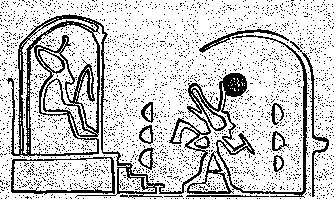
Here. 1. To catch
eels in a snare of sliding knots; pole used in this
manner of fishing, with a perforation for the line. 2.
To tie, to fasten, to lash; rasp made of a piece of
obsidian with one rough side; cable, tie; figuratively:
pact, treatise. Vanaga. 1. To lash, to belay, to knot
the end of a cord, to lace, to tie, to fasten, to knot;
to catch in a noose, to strangle, to garrote; here
pepe, to saddle; moa herea, a trussed fowl;
hehere, collar, necklet; herega, bond,
ligament; heregao, scarf, cravat. 2. Hakahere.
To buy, to sell, to barter, to part with, to pay for, to
do business, to compensate, to owe, to disburse, to
expiate, to indemnify, to rent out, to hire, to traffic,
to bargain, to bribe; merchant, trader, business,
revenge; tagata hakahere, merchant, trader;
hakahere ki te ika, to avenge; hakaherega,
ransom, redemption; hakahererua, to exchange, to
avenge. 3. Here ei hoiho, incense. Churchill.
Hereke, festering wound, cracked skin. Barthel 2. |
| te
hereke.he ui atu te ariki.a Hotu.ko te pu.o te |
King Hotu looked down on the
loop of the rope [ko te
pu.o te taura], which was open, as it was lying there,
covered with grass [ku
hakaehu ana hai mauku]. He moved his foot [he
oho.te vae] and stepped on
the edge of the loop. |
| taura.ē
hatata era.ai ka moe no.ku hakaehu |
| ana hai
mauku.he oho.te vae he rei i te titi o te |
|
Rei. 1. To
tread, to trample on: rei kiraro ki te va'e. 2.
(Used figuratively) away with you! ka-rei kiraro koe,
e mageo ê, go away, you disgusting man. 3. To shed
tears: he rei i te mata vai. 4. Crescent-shaped
breast ornament, necklace; reimiro, wooden,
crescent-shaped breast ornament; rei matapuku,
necklace made of coral or of mother-of-pearl; rei
pipipipi, necklace made of shells; rei pureva,
necklace made of stones. 5. Clavicle. Îka reirei,
vanquished enemy, who is kicked (rei).
Vanaga. T. 1. Neck. 2. Figure-head.
Rei mua =
Figure-head in the bow.
Rei muri = Figure-head in the stern. Henry.
Mother of pearl; rei
kauaha, fin. Mgv.:
rei, whale's
tooth. Mq.: éi,
id. This is probably associable with the general
Polynesian rei,
which means the tooth of the cachalot, an object held in
such esteem that in Viti one tooth (tambua)
was the ransom of a man's life, the ransom of a soul on
the spirit path that led through the perils of Na
Kauvandra to the last abode in Mbulotu. The word is
undoubtedly descriptive, generic as to some character
which Polynesian perception sees shared by whale ivory
and nacre. Rei kauaha
is not this rei;
in the Maori whakarei
designates the carved work at bow and stern of the canoe
and Tahiti has the same use but without particularizing
the carving: assuming a sense descriptive of something
which projects in a relatively thin and flat form from
the main body, and this describes these canoe ornaments,
it will be seen that it might be applied to the fins of
fishes, which in these waters are frequently ornamental
in hue and shape. The latter sense is confined to the
Tongafiti migration. Reirei, to trample down, to
knead, to pound. Pau.: Rei-hopehopega, nape.
Churchill. |
| taūra.he
ui mai te ariki.a Oroi.ku ōo.ana te |
King Oroi saw that the foot of King Hotu was in the
loop and pulled the rope. King Hotu let himself fall to the ground (on
purpose). |
| vae o te
ariki o Hotu.ki roto ki te taura.he kariti |
| i te
taura.he hakahinga te ariki.a Hotu.i a ia. |
| ana ki
raro.ku rei ana te ariki a Hotu. i te taura. |
But in doing so, King Hotu firmly
stepped with his foot on the rope [ku
rei ana te ariki a Hotu. i te taura] ... |
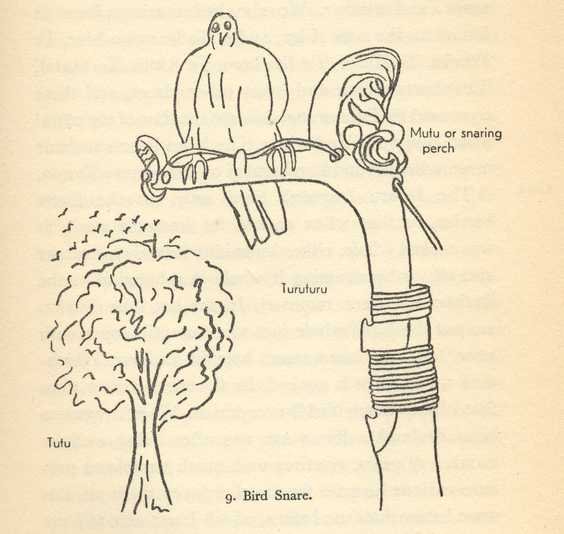
...
Pewa-o-Tautoru, Bird-snare-of-Tautoru; the constellation
Orion in New Zealand. The Belt and Sword form the perch, te
mutu or te teke, while Rigel is the blossom cluster,
Puanga, used to entice the unsuspecting bird. To
visualize the bird-snare we must remember that Orion, as we see
it in the northern hemisphere, is upside down to the view
obtained from New Zealand where Orion stands in the northern sky
...
|




